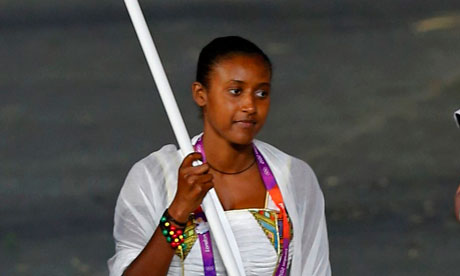
Yanet Seyoum, Ethiopia's first ever Olympic swimmer, carries her country's flag at the opening ceremony. Photograph: Mike Blake/Reuters
When Yanet Seyoum took to the water for her Olympics 50m freestyle heat, it was a fair bet that most of her fellow competitors would not have endured a training regime of avoiding doggy-paddling tourists in a hotelswimming pool, or relied mainly on written instructions from a coach who lives in another city.
Seyoum - the first swimmer from Ethoipia to ever make it to the Olympics - came last in her heat and failed to make it to the semi-final. Her finishing time was a personal best of 32:41, a whole 2:40 slower than the heat winner Karin Clashing O'Reilly of Antigua and Barbuda and nearly eight seconds behind the fastest qualifier, the Netherlands' Ranomi Kromowidjojo.
But the 18-year-old, a lone swimmer in a country famed for its long distance runners, has high hopes for the future.
"I would like to see professional swimmers in my country," Seyoum said, speaking before the Olympics among the guests and leisure swimmers around the pool of the Ghion hotel, a popular hangout for Addis Ababa's middle classes. "But this requires swimming clubs."
Ethiopia has won 38 Olympics medals, 18 of them gold, since the 1956 Games, every one of them in running events of 3,000m or longer. When you look at the country's swimming infrastructure it is not hard to see why the sport has not featured. The Ghion's pool, Olympic size but often cold and sometimes busy, is Seyoum's best option for training.
Her coach lives in Nazret, a city about an hour by bus from the capital, a trip Seyoum takes irregularly for instruction. And in the meantime? "Oh, no problem, everything is written here," she said, flipping through a written training programme the coach sends every week.
Given the conditions it is little surprise that Seyoum's personal best for the 50m freestyle before London 2012 was 33.17 seconds, very nearly 10 seconds longer than the world record of Germany's Britta Steffen, the reigning Olympic champion. Before Friday's competition she was also some distance from the 25.27 second official Olympic qualifying time for the event, but was among around 150 swimmers granted special dispensation to compete by Fina, the sport's governing body.
But Seyoum is not another Eric "the Eel" Moussambani, the Equatorial Guinea swimmer who took almost two minutes to complete his 100m freestyle heat at the 2000 Sydney Games. The Ethiopian teenager competed at last year's swimming world championships, recording a faster time than 14 other competitors.
While Seyoum trained intensely for the Olympics – "I have been dreaming of this since I was a child" – she was realistic about her likely future occupation.
The English-speaking product of Ethiopia's middle classes – her father is a driver for an aid agency while her mother works for EthioTelecom – Seyoum is simultaneously taking an engineering degree at Addis Ababa Science and Technology University, a situation that put her training under strain. Just before the Olympics she was forced to cut her training back from seven days a week to five, in order to prepare for her end of year exams. She regularly worked until 1am, slept for five hours before going to university in the morning and the pool in the afternoon. "The most challenging thing is to combine my first year of engineering study and my training," she said. Seyoun learned to swim at the age of 12, taught by her father at a pool in Kombolcha in the north of Ethiopia, best known to outsiders as a UN base during the 1985 Ethiopian famine. "One day I participated in a swimming competition, for fun, and I won the silver medal. It's how everything started," she said.
Her unique status has already brought a measure of celebrity. In May, Seyoum helped at the ceremony to raise the Olympic flag at the British embassy in Addis Ababa. She will be among three Olympic hopefuls profiled in a British-made film due to air soon on Ethiopian TV. The other two, of course, are runners.
Despite coming last in her heat, Seyoum will return home a champion. The news of her failure to qualify was posted on the website Ethio Sports. Soon after, one reader had thanked her for representing the country. Another, identifying themselves as Ken, was sure that it wouldn't be her last Olympic performance. "We are very proud of you to represent our beloved country for the first time (Swimming) in Olympic," he wrote. "I am sure you going to reward us with gold the year 2016. Thank you Yanet.
